Student Sharing - NIE X HKU Online Collaboration Programme
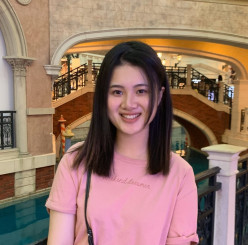
Cao Yexin, Rachel
Bachelor of Arts and Bachelor of Education in Language Education - English
March 2021 has been a busy yet extremely fulfilling month for me. Being a student representative for the NIE x HKU Virtual Collaboration, I gained the valuable opportunity to reach my fullest potentials in being a team player as well as an event organiser.
As the programme is student-led, Crystal and I, the two HKU student representatives, had meetings with NIE representatives for several times before the actual collaboration started. I could still clearly remember our first meeting, when we had little knowledge of each other’s cultures and raised every question with caution. Now, however, we have become friends. We feel relaxed when we meet, and we find time to have meals together over ZOOM, with laughter frequently heard.
The same applies to my collaboration with HKU peers. My partner Crystal is amazingly responsible and trustworthy. The other six HKU teammates – Alex, Ben, Cynthia, Hedy, Melody and Tiffany – actively participated in all discussions and prepared appealing presentations for each webinar. We developed great bonding and I feel so grateful for working in both teams surrounded with all the great people.
While preparing for each webinar, the representatives from both schools actively attempted different formats and approaches to explore what would work the best. The first webinar appeared not so interactive, hence we added in Kahoot for the second webinar, which all participants enjoyed. While we put one pair of buddies in each breakout room for discussion in the first webinar, we put two pairs in each room starting from the second. I also ensured that everyone had different groupmates for the second and third webinar, maximising the chances of meeting new friends for all participants. The process of brainstorming how to benefit everyone the most trains my event organisation and coordination skills, especially in the setting of this new “ZOOM Era” to a large extent.
Finally, I would like to extend my sincere gratitude to all who have made this new virtual collaboration programme possible under the pandemic – our supportive HKU teachers and staff, all passionate HKU and NIE representatives and participants, as well as our attentive audience. It is your great support that makes my work more worthwhile than ever.
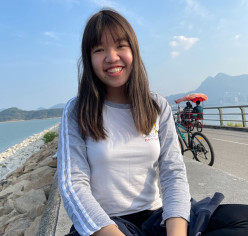
Ng Tsz Ying, Crystal
Bachelor of Arts and Bachelor of Education in Language Education - English
COVID-19 has stopped us from travelling and meeting people from different parts of the world. However, this virtual collaboration programme has provided us a precious opportunity of learning and meeting student-teachers from Singapore virtually. We learnt a lot together and built meaningful relations in the past month.
For the learning part, students from both sides had a chance to prepare a 20-minute sharing on educational issues. While we were gaining new insights on the Singaporean education system, we also deepened our understanding towards our own which is undoubtedly helpful for us as prospective teachers. With the two chosen movies - _Little Big Monster_ and _I Not Stupid Too_, we exchanged views on teaching such as whom and how to teach.
Regarding the relations, I am honoured to have the opportunity of being a student representative with Rachel. Wondering what we could and would do, we had our first meeting with NIE representatives. Despite all the worries I had before, we cooperated with each other well even via online meetings and text messages. It is so great to see students from both sides work hard to provide our participants with a good virtual exchange experience.
With the buddy system, I am lucky to have met my buddy ShiMin from NIE. Although we do not meet each other face to face, we developed friendship through meetings every week. I have gained a better understanding of how being a NIE student is like with the vlog filmed by my buddy.
I especially like the quote “Life is beautiful not because of the things we see or do. Life is beautiful because of the people we meet” used in the closing ceremony video. We met each other and we learnt, discussed and grew. This quote sums up the gratitude I have towards everyone I have met in this programme.
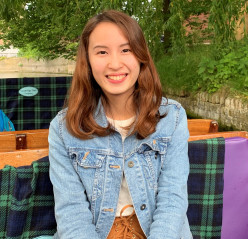
Hui Lok Hang, Hedy
Bachelor of Arts and Bachelor of Education in Language Education - English
COVID-19 has posed a great challenge to all of us, with the “tele-everything” world becoming the new normal. While overseas exchange and face-to-face collaboration have been suspended unfortunately, we had the pleasure to participate in a virtual exchange programme between HKU and NIE. In the programme, we had a total of three webinars, sharing an array of educational issues in Hong Kong and Singapore. I have never been to Singapore before, and frankly speaking I did not know much about the education system in Singapore. Hence, listening to the sharing by NIE students has truly broadened my horizons and deepened my understanding about Singapore. In particular, I remember that students in Singapore can attend specialised schools such as Singapore Sports Schools and School of the Arts which my buddy graduated from. This has inspired me to reflect on how to encourage students with diverse abilities and interests to pursue further education in alternative pathways, as people in Hong Kong tend to think that attending university is the only way to success. Moreover, my partner and I were responsible for webinar 2, in which we shared about the education reform in Hong Kong. When preparing for our sharing, we conducted in-depth research into sub-topics including the “3-3-4 Scheme”, HKDSE and the proposed Liberal Studies reform by going through government documents and literature. From this, we have gained a deeper understanding about our own education system, and it is surely a good out-of-classroom experience.
Apart from the fruitful webinars, I find the discussion with my buddy and fellow participants immensely interesting. In each webinar, we were divided into the breakout rooms for further discussion about the sharing and movie review. All of us shared our points of view and personal experience, for example, how we perceive corporal punishment. All in all, I am really grateful for this virtual exchange opportunity. Not only have I learnt more about education in Hong Kong and Singapore, I have also met many good friends. I hope that we will be able to see each other in the near future!
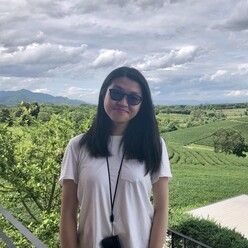
Lau Ka Tai, Melody
Bachelor of Arts and Bachelor of Education in Language Education - English
What are the education policies implemented in Hong Kong and Singapore? How do they coincide or differ? What educational and profession-related issues do they share? What factors induced such issues? These were some of the questions we had in mind before joining the new NIE x HKU virtual collaboration. Having two of the world’s highest performing education systems, both Hong Kong and Singapore have been held in high esteem for their policy success. Yet, they are also notorious for their examination-oriented nature and high-pressure learning environment. I was drawn to understand the inner workings of both education systems and how the reforms and alterations they made attribute to their successes and existing issues. Amid such challenging times of the pandemic, the collaboration opportunity has granted me an invaluable overseas experience to gain better perspectives on the issues raised.
The three webinars were immensely useful and informative, in which we had in-depth discussions of the education aims, academic structures, assessment mechanisms, curricula and educational issues. Taking the responsibility to present Hong Kong’s education reform, not only have I learnt to interactively deliver the presentation through online means, but I have also drawn a deeper understanding of our own education reform in the research process. The interactive presentations and quizzes facilitated better consolidation of ideas, while discussion questions at the end of each webinar prompted us to reflect on the issues in relation to our teaching and learning experiences. I am particularly impressed by the two movie sharing sessions, where we reviewed two movies (one from Hong Kong and one from Singapore) and examined some universal educational issues of both cultures. It allowed me to rethink about teacher-student interactions and how eradicating stereotypes and embracing diversities can make a difference in classroom teaching and learning.
It was a fruitful, inspiring and humbling experience to have met and exchanged with brilliant minds from our Faculty and NIE through the webinars and the buddy system. They have broadened my horizons regarding education in international contexts, and introduced me to their campus lives and culture. I am more than thankful to have participated in this collaboration. Given the success of this virtual collaboration, I hope that we can have similar exchange opportunities in the near future and overcome barriers in face of the pandemic.
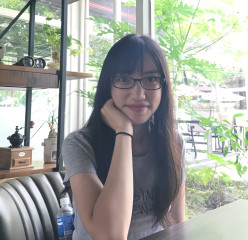
Lo Cheuk Wing, Cynthia
Bachelor of Arts and Bachelor of Education in Language Education - English
Covid-19 pandemic disrupted our normal schedule and resulted in a lot of uncertainties associated with this virtual exchange programme with NIE student-teachers. Before the launch of the programme, I doubted the effectiveness of exchanging teaching ideas solely via webinars. Nonetheless, this programme turned out to be a successful one that fostered collaboration between NIE and HKU student-teachers, specifically through professional and cultural exchange activities.
The programme was well structured with three online webinars on education system, educational reform and curriculum respectively. These webinars allowed me to critically examine the merits and demerits in Hong Kong's education system and reflected on my own teaching approach to promote student-centred learning. Catering for learner diversity is a major issue that both Hong Kong and Singapore student-teachers strive to address, given the exam-oriented cultures of both regions. Unfortunately, we may be confronted with some challenges in classroom contexts, including tight teaching schedules and inadequate resources. With an acute awareness of these challenges, we mutually agreed on the power of passion and empathy which will hopefully help teachers overcome all these barriers. Sometimes, a small act can result in a great impact on a student’s life. For instance, sparing some time to chat with students allows teachers to have a better understanding of their learning progress and thus design more individualised materials to support their learning. This can motivate students to learn and lessen the emotional burden the system has imposed on them. One key insight I have learnt from the programme is to adopt a more humanised teaching approach. Dissemination of knowledge is only one of teachers’ responsibilities. To be a good teacher, we should also learn to provide a supportive learning environment that motivates students to learn.
This programme is a perfect example of how learning can take place in a relaxing and supportive environment. Besides professional exchanges on teaching, I also learnt more about Singapore’s language and culture through the buddy system. I sincerely hope that there will be a Singapore exchange tour to meet our buddies in person when the COVID-19 situation improves!
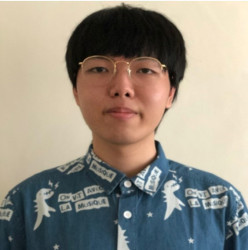
San Yiu Ching, Alex
Bachelor of Education and Bachelor of Science
Since the pandemic outbreak in 2019, travelling has become nearly impossible and the distance between people seems to have become further due to the limited in-person interaction. Yet, although this programme is carried out virtually, I never felt distant from the people I met. As the programme was well-organised by the Faculty’s School-University Partnerships Office and the student representatives, the experience was so good that everyone participated proactively and we had many interactions even on the ZOOM platform.
Throughout the programme, there were different activities such as webinar and movie review. Ben and I collaborated for the first webinar which was about the education system in Hong Kong. I learnt a lot when researching the background and the current situation. At the same time, when attending the webinar, I learnt the differences between Hong Kong and Singapore. For instance, Hong Kong students take the HKDSE exam after secondary school while Singapore students may go to junior college. For the movie review, I learnt about the cultural differences and education issues in both places through the two meaningful movies: _Little Big Master_ and _I Not Stupid Too_.
Apart from the above, the buddy system is wonderful because it provided me an opportunity to meet friends in Singapore. I learnt more about their culture such as cuisine and daily life there. I hope one day we can meet each other face to face and share more about these two places.
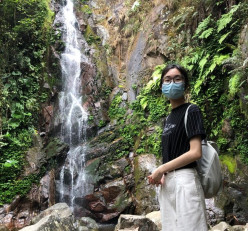
Tsui Hoi Lam, Tiffany
Bachelor of Arts and Bachelor of Education in Language Education - English
The five sessions in the programme provided me the valuable opportunity to learn about the educational systems, reforms, curricula and issues in Hong Kong and Singapore. Furthermore, under the buddy system, I was able to have one-on-one exchange with my buddy and acquire some additional information about Singapore, such as their university life, school holidays in secondary school, prospective teachers’ job allocations.
Through the exchange, I could compare and contrast the similarities and differences of education between Hong Kong and Singapore. For example, there is compulsory streaming into Normal and Express in Singapore, though this would end in 2024 due to educational reform. The reform attends to individual needs and enables less competition between students. Students are allowed to customise the level (normal or express) they would like to learn for each subject. In terms of assessment, students would receive their real grades instead of curved grading. Also, there is more diversity in Singapore secondary school, like having a sports school. These differences allow me to evaluate the strengths and weaknesses of Hong Kong education, and seek directions of improvement through learning about other education systems.
Since the webinars are student-led, I also learnt to appreciate the efforts my peers and teachers of both schools have made to make things happen. In each webinar, we had a feedback form to collect opinions and a group discussion session. Also, I noticed improvements made in the course of time for better exchange. For instance, we allocated two pairs of buddies instead of one into a breakout room, and we also utilised more online learning tools such as Kahoot and Metimeter after the presentations to increase interaction and check understanding. In the second movie review, Padlet is used for students to note what they have discussed. The improvements and the presentations done by different groups replicate an online lesson, which helped me to gain insight on how to organise activities and how to teach to facilitate learning.
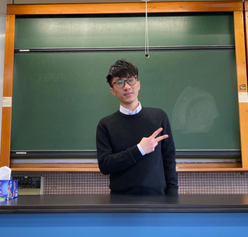
Wong Ming Chun, Ben
Bachelor of Education and Bachelor of Science
Due to the COVID-19 situation, the collaboration between student-teachers of NIE and HKU is carried out virtually. It is a completely new initiative for both institutions. Fortunately, it was held successfully with the collaborative efforts of all parties. I am very grateful to have participated and to have gained valuable experience and knowledge.
Our webinars usually begin with presentations. The topics range from the education systems in Hong Kong and Singapore, curriculum and education reform to potential educational issues. I think it is an interactive approach to discover the similarities and differences between the educational systems and progress. Although Hong Kong and Singapore are both knowledge-based and modernised, they share quite different educational strategies especially in the diversity of post-secondary education.
The most impressive sharing for me is about the biology curriculum by NIE students. I study biology education and would like to take reference from the strengths of the Singaporean curriculum. I found out that their curriculum design is more innovative, as it is based on the nature of topics such as systems, models and technologies. Take the system as an example, this area includes various biological systems such as digestive system, transport system and ecosystem. But in Hong Kong, the curriculum is usually divided by the units of topics such as humans, plants and ecology. I personally think that the alternative approach will be better to understand the meaning of a system and then discuss various systems in the world, instead of limiting it to specific types of units (e.g. humans).
Another appealing feature of the programme is the buddy system. It is fortunate that Yan Lin, my partner, is also from biology education. We shared about our life on campus and teaching practicum. Although the programme has ended, we still keep in touch. I hope we can meet each other face to face one day.
